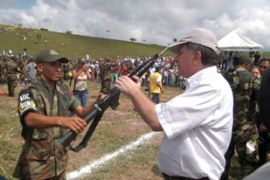Colombia moves to save peace deal
President tries to keep peace accord with former right-wing paramilitaries on track.

Sedition doubt
The change of heart will be a boost for Uribe who has described the deal with the paramilitaries as the biggest step towards ending Colombia’s long war with left-wing rebels.
More than 31,000 paramilitaries have turned in thier arms over a three year period in a deal that promises them reduced jail sentences for crimes ranging from torture to massacre.
The agreement is based on the idea that former “paras” would be charged with sedition, and not criminal activity, as left-wing guerrillas have been in the past.
This would help them avoid cocaine-smuggling charges and protect their ambitions for running for public office.
However, the supreme court had ruled that the charge of sedition would not apply because the paramilitaries never tried to overthrow the government, and had worked with the army in their fight against left-wing rebels.
But Uribe said it was a double standard to allow former fighters from the M19, a disbanded right-wing armed group, to serve in congress, as some of its members have done, while not allowing other paramilitaries.
Uribe has said that the court was “ideologically biased” and has proposed a law to guarantee political rights to demobilised paramilitaries who are not directly guilty of atrocities.
He has denied accusations that he sympathises with the paramilitary cause.
The court has said in a statement that Uribe’s comment was “a serious and dangerous form of censorship”.
Unresolved conflict
The paramilitaries were formed in the 1980s to protect cattle ranchers, drug lords and citizens from rebel kidnappings and land grabs.
The right-wing armed groups have profited from Colombia’s multibillion-dollar cocaine trade and were known for killing peasants accused of cooperating with left-wing rebels.
Rights groups have said that the peace deal is not strong enough in forcing the paramilitaries to dismantle their extortion and drug-trafficking networks.
Several demobilised militia members had planned to run for local government posts in elections scheduled for October.
Those campaigns are now uncertain as the country tries to work through the legal issues involved in allowing them to run for government office.
“There is evidence that many demobilised paramilitaries are still involved in crime, so it may be premature to let them run for public office this year,” Mauricio Romero, who serves on the national commission for reparation and reconciliation, said.
The president’s reputation overseas has been damaged by a scandal in which some of his closest political allies, including Mario Uribe, his cousin, are being investigated for illegally supporting the paramilitaries.